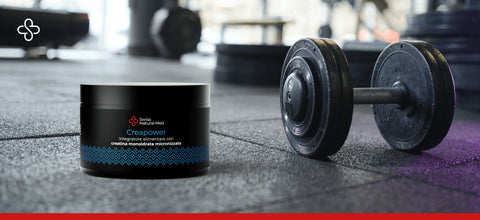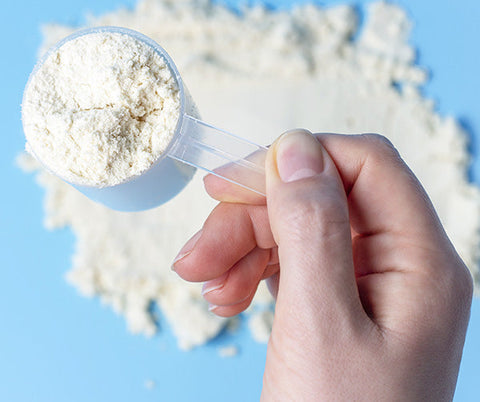What is creatine?
Creatine is a tripeptide, which is the union of 3 amino acids, Glycine, Arginine and Methionine.
How much creatine to take per day
The recommended daily dose of creatine is approximately 3 grams . This amount is considered safe and effective according to both the Swiss Food Ordinance (FDHA) and the opinions of the European Food Safety Authority (EFSA).
When to take creatine?
The effect of the timing of creatine supplementation on adaptations to resistance training is still under study.
The theory is based on two main factors:
- Creatine Distribution: Increased muscle blood flow during exercise may enhance creatine distribution to muscles, influencing creatine uptake and retention.
- Timing: Plasma creatine concentrations peak approximately 2 hours after ingestion of 5 grams and remain elevated for approximately 4 hours . During exercise, muscle blood flow increases significantly, returning to normal values within 30 minutes of cessation of activity.

Considering a typical 70-minute resistance training session, taking creatine before exercise could theoretically better align the increased blood flow with the elevated creatine concentration in the blood.
This may promote better absorption than taking post-exercise.
Additionally, taking it during exercise may be less effective due to reduced digestion, a result of decreased blood flow to the digestive system during physical activity.
These hypotheses, although promising, require further research to reach definitive conclusions on the optimization of the timing of creatine supplementation in relation to exercise.
How to improve creatine absorption
Creatine is best absorbed when insulin is elevated above baseline.
Therefore, taking insulin-raising nutrients, such as glucose or potassium, with creatine can improve creatine absorption by up to 60%.
Furthermore, the combined intake of protein, carbohydrates and creatine improves creatine absorption even more than creatine alone or the same carbohydrates with creatine.
Consuming 70-100 grams of high glycemic carbohydrates with creatine stimulates an insulin spike that promotes creatine uptake by muscles.
Insulin also allows sodium molecules to move out of the cell, thus improving the cell's ability to absorb creatine.
Alternatively, combining creatine with a protein-carbohydrate blend (using about half the carbohydrates, or 35-50 grams) can produce a similar effect, due to the synergistic action of protein and carbohydrates on insulin secretion.
This approach also requires fewer carbohydrates, making it an attractive choice for those following low-carb diets or trying to control their overall calorie intake.
An innovative option to further exploit this mechanism related to the sodium-potassium ratio to better absorb creatine is the intake of Powerday (micronized potassium bicarbonate) , you will have an effect similar to the use of carbohydrates, without having to risk the excess high glycemic index carbohydrates turning into fat.
The Role of Sodium-Potassium Pumps on Creatine Intake
Sodium-potassium pumps are structures within cells that help maintain the balance of sodium and potassium levels inside and outside cells.
They essentially function as " gates " that actively pass these minerals through as needed by the cell.
How to take advantage of this system? Here it is explained simply:
- Exercise stimulates the production of insulin, the hormone that helps bring sugar and other nutrients into cells. This increases the activity of the sodium-potassium pumps, making it easier to absorb creatine .
- During training, muscle cells use up a lot of energy, which lowers creatine levels within them. After training, the creatine-starved cells will be more likely to absorb more of the creatine you get from your diet or supplements .
- Exercise also stimulates blood flow, bringing more nutrients, including creatine, directly to your muscles .
Therefore, it would be ideal to take creatine before or immediately after training , when the sodium-potassium pumps are particularly active and the muscles are ready to absorb more creatine.
Additionally, because increased activity of the sodium-potassium pumps persists for an extended period of time after exercise, taking creatine immediately before or after training may offer greater benefits than other times of the day.
Creatine Cycles
In the context of creatine intake, one often comes across two main approaches, called cycles of use:
- 20 grams per day for 1 week, followed by 5 grams per day for 3 weeks (not recommended) : This method includes a loading phase with 20g/day for 7 days which exceeds the daily dose recommended by the Swiss federal ordinance and EFSA. Consequently, it is considered a daily amount higher than the safety limit established for the entire European Community and Switzerland.
- 3 grams per day for 4 weeks (recommended) : This approach is considered the safest and most effective. It is not necessary to exceed 3 grams per day, as this amount is sufficient to saturate the body's muscle creatine stores within 28 days.
Is it necessary to take creatine even on non-workout days?
The answer is yes : during the cycle it is important to maintain a regular daily intake of 3 g for about 28 days to significantly increase muscle creatine stores, allowing an increase of 20 to 40% and maximizing the associated benefits.
The most important advice we feel we can give is to always choose a creatine of excellent quality, thus guaranteeing purity and effectiveness.
Additionally, it is essential not to exceed the recommended amounts to maintain safe and healthy intake.
What type of creatine supplement is best to take?
It is important to know that creatine is not stable in a liquid formulation, it tends to easily degrade into creatinine.
This instability makes liquid versions of creatine less reliable and potentially less effective than powdered forms.
The most widely studied form of creatine, and therefore considered the safest and most effective, is creatine monohydrate powder, also known as creatine monohydrate.
Do you want pure, high-quality creatine? Try CREAPOWER, the creatine monohydrate supplement that meets the highest quality and performance standards, and invest in your well-being by choosing a product that supports you in every phase of your training journey.
This specific powder formulation has been shown to be highly bioavailable and stable.
For these reasons, creatine monohydrate remains the preferred choice of athletes, sports nutritionists and researchers in the field of sports supplementation.
How much water should you drink with creatine?
There is no hard and fast rule on exactly how much water to use with 3 grams of creatine. However, most recommendations suggest using at least 250-300 ml of water per 3 grams of creatine .
Some studies have used up to 500 ml of water for similar doses.
The important thing is that the creatine is completely dissolved to ensure optimal absorption.
Can I take protein with creatine?
Yes, it is possible and potentially beneficial to take creatine along with protein powder .
Taking creatine with 50 grams of protein and 50 grams of carbohydrates can increase creatine retention in muscles by 25% compared to creatine alone.
A great way to take creatine along with carbs and protein is to mix 3 grams of creatine in 250-300 ml of water and take it along with your protein shake, so you can improve its absorption.
Bibliography




